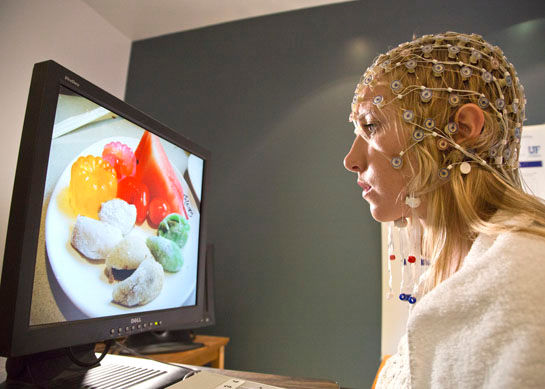
A BYU student wears an EEG recording device to demonstrate how researchers measured neural responses to food after exercise. (Photo courtesy of Brigham Young University).
It’s a question that has been debated for decades—does intense exercise help people lose weight or does it stimulate the appetite and actually make it more difficult to limit calories and food intake? A new study may finally offer some answers.
JOIN THE CONVERSATION!
What do you think about the findings of this study? Do you agree with them? How do you advise clients who claim that exercise makes them feel hungrier? Let us know your thoughts in the comments section below.
Researchers at Brigham Young University studied the food motivation of 35 women (18 normal-weight and 17 obese) over a two-day period. On the first day, each participant walked on a treadmill at a brisk pace for 45 minutes (3.8 mph; 0% grade). Within one hour of their workouts, which occurred first thing in the morning, the women’s brain waves were measured using an EEG machine while they viewed 240 images—120 images of meals and 120 images of flowers (which served as a control). One week later the women returned and, at the same time of day, viewed the images again while their brain waves were measured, but without exercising first. On both days, participants also recorded what they ate and any exercise they completed was measured using an accelerometer.
After examining the brain-response data, researchers concluded that the women’s brains had a lower response to the food images after the 45-minute exercise bout. Furthermore, both groups of women showed an increase in total physical activity on the day they walked on the treadmill. Perhaps most significantly, the women did not eat more on the exercise day to compensate for the calories burned. In fact, they ate about the same number of calories on both days of the study.
“This study provides evidence that exercise not only affects energy output,” says study co-author Dr. James LeCheminant, “but it also may affect how people respond to food cues.”
Michael Larson, Ph.D., another study co-author, says that this is one of the first studies to look specifically at neurologically determined food motivation in response to exercise. Further research is needed, Larson says, to determine how long the diminished food motivation lasts after exercise and to what extent it persists with consistent, long-term exercise.
Source: Hanlon, B. et al. (2012). Neural response to pictures of food after exercise in normal-weight and obese women. Medicine in Science & Sports & Exercise, 44, 10, 1864–1870.